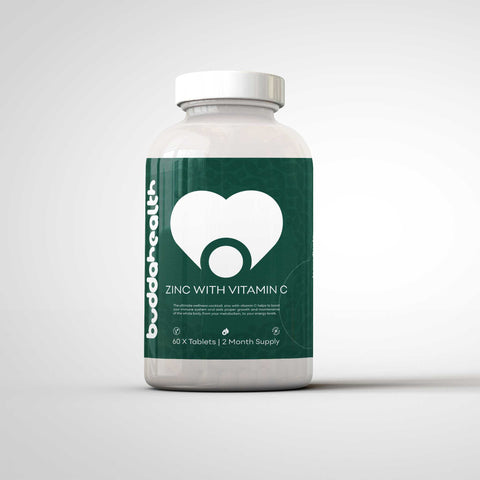If the pandemic taught us one thing in the UK and Ireland, it should be the value of our immune systems. This is especially true now that we know 40% of patients with weakened immune systems have lower responses to the Covid-19 vaccine.
Well, immunity during winter is a neglected topic in health class, but it’s very important for your long-term health. Let’s talk about how to boost your immune system during the winter months!
WHY IMMUNE SYSTEM HEALTH IS SO IMPORTANT IN WINTER
Winter is a time when we get fewer hours of sunlight, less exercise, and when our diets often slip. Without a healthy immune system, you can’t have a healthy body for too long.
That’s why taking steps to boost your immune system during the winter is critical. This is especially true if you find that you lack energy and motivation in the winter. Let’s talk about some of the factors in immune health.

MAJOR FACTORS OF IMMUNE HEALTH
Vitamin C isn’t the only factor in your immune system. Sleep, exercise, overall health, mental health, and sun exposure are just a few examples of factors that impact your immune system.
There are hundreds of secondary factors that studies suggest play a role in our immune health, such as social interaction, physical touch, stress levels, and more.
HOW TO BOOST YOUR IMMUNITY DURING WINTER
A healthy lifestyle is the best way to improve immune health. If you live an unhealthy lifestyle during the winter, changing that is the first step. However, here are some of the best ways to focus on your autoimmune health.
EXERCISE
If there was a pill that could do everything that exercise does for your body, it would be the greatest advancement in medical history.
During the winter, many find it challenging to get enough exercise into their routines. It is strongly recommended to perform around 150 minutes of aerobic exercise every week, as exercise can help the immune function and immune response, as regular exercise is often linked to better health conditions and improved blood pressure in humans.
Do you struggle to get exercise during the winter? Joining a gym and getting on the treadmill or Stairmaster is always a good idea, but those options aren’t for everybody. Luckily, there are plenty of ways to get exercise during the winter. Here are some indoor examples:
- Rugby
- Indoor soccer
- Boxing
- Martial arts
- Yoga
- Pilates
- Dance
- Circuit training
- Calisthenics

Of course, you will need to find a facility for many of these to make them into a habit. However, some of these can also be performed in the comfort of your own home, meaning you don’t have to face that winter weather to get to a gym!
The best of these examples for carrying out at home are Yoga and Pilates. All you need for these exercises is a good yoga mat like the Buddalife Biocrystal Yoga Mat and maybe a YouTube tutorial to follow along to. Not only will these exercises help build your immune system, but by using the Buddalife Biocrystal Yoga Mat you will experience the benefits of biocrystal technology which is scientifically proven to reduce your stress levels, reduce your muscle tension, increase your oxygen levels, and decrease the impacts of EMF around you. In turn, these benefits will help maintain a stronger immune system.
If yoga and pilates aren’t your cup of tea, and you don’t have access to a gym or a sports centre, don’t worry, there are plenty of outdoor activities you can take up! Let’s take a look at some of them now.
GET OUTSIDE
We can’t stress enough how important it is to get outside during the winter. Humans are not meant to be inside all the time.
If you’re not a winter person, this can be challenging. However, even if you achieve all of your exercises needs inside, here are some options for outdoor activities that you should try:
- Winter hiking
- Walking
- Build something
- Work out outside

Get creative as you want. Building a fort is a great way to relive your childhood and keep yourself healthy throughout the winter.
Go for a walk and see a waterfall surrounded, take a walk to the store instead of driving. The options are truly endless.
Being trapped inside increases levels of anxiety and depression, which harms your immune system. When you find an excuse that you can find to get outside, take it!
HAVE A HEALTHILY DIET
One of the most important nutrients is vitamin C, which is found in large quantities in green vegetables, citrus fruits, kiwi, and bell peppers. However, a well-rounded diet consisting of whole foods is absolutely the best way to promote a healthy immune system. Here’s what you need.
Fruits and Vegetables
Please, don’t skip this section. This is by far the most important factor in your journey to immune health, as a balanced, healthy diet is one of the keys to increasing immunity during the cold season.
Seriously, your body needs quality vitamins, antioxidants, minerals, and other micronutrients to promote immune health, and leafy greens and fresh fruit are excellent sources of vitamins, especially vitamin C, which help your immune cells fight through the flu season and common cold. The best sources of these nutrients come from fruits and vegetables.
The best way to introduce the widest variety of nutrients is to use a wide variety of colours. The colours of fruits and vegetables reflect the nutrients they contain and diversity is key.
If you have a bit of a sweet tooth and you find yourself eating too many desserts, try replacing these impulses with more delicious fruits. Berries tend to have the highest nutritional value, but there’s no such thing as an unhealthy fruit, so eat your favourites!
The same goes for vegetables. Dark leafy greens are very high in nutritional value and should be incorporated into your daily meals. Salads and soups are a very easy way to incorporate a wide variety of vegetables into your diet, but you should do what works for you!
Most importantly, cook healthy foods that you enjoy. If you don’t enjoy them, it’s unlikely that you will stick to eating them. Look for healthy recipes online and make a new hobby of cooking for yourself!
It’s especially important to find foods that you enjoy because the NHS recommends eating 5 servings of at least 80 grams of fruits and vegetables every day, this helping you against heart disease, viral infections or respiratory infections. The serving sizes can be increased, alongside a dedicated balanced diet, especially for pregnant women, or at the first signs of any cold symptoms you might experience.

Use Healthy Alternatives
Dairy and eggs are good sources of nutrition when used in moderation, but they are often overused in our diets. Try to use other protein sources like beans, legumes, and lentils. Fatty meats should generally be avoided.
Also, try to avoid low-quality carbs and instead eat whole grains like oats, brown rice, and whole-grain bread. Incorporate healthy nuts and seeds into your diet for even more autoimmune assistance as well as heart, brain, and joint health!
Treat Yourself
However, it’s also important to treat yourself occasionally. Don’t go overboard, but rewards are good for our health during the winter. Shopping, getting our favourite coffee order, or baking our favourite treat occasionally is healthy if done in moderation.
In Denmark, it’s tradition to indulge in the pleasures of life like eating chocolate, sipping hot beverages, setting the right atmosphere, and spending time with loved ones. This is called hygge, and the Danes regard it as the secret to happiness during the winter months. However, this can easily go overboard.
SOCIALIZE
Similar to getting outside, our social lives play a major role in our mental health and immune systems, and they often suffer in the winter. Make time to visit loved ones and spend quality time inside and outside!
Oxytocin, known as the “love hormone” or the “cuddle hormone”, is released during social interaction, which helps boost our immune systems. Physical contact, prolonged interactions, and even eye contact help our bodies produce this important neurotransmitter.
If you have a partner or significant other, winter is the perfect time to cuddle up and watch a movie! Not only does it feel nice in the moment, but it also has important health benefits.
Remember, mental health plays a major role in our immune health, and isolation will only serve to harm our mental health. We are social creatures, so make time in your busy schedule for loved ones!
GET ENOUGH SLEEP
Quality sleep, that is. In the winter, it’s perfectly acceptable to take a nap if you have the time.
At night, try to wind down for bed as early as possible and shut off electronics at least an hour (preferably two) before you intend to go to sleep. Also, going to sleep early in the winter and waking up early will help you maximize the amount of daylight you see and ensure that you are getting adequate sleep.
Avoid alcohol or sleep medications if possible. Natural sleep is the best for your health, and if you’re able to get a little more than you do in the warmer months, that’s even better.
For example, if you find that you function best on 7 and a half hours of sleep during the summer, aim for 8 and a half or 9 hours during the winter. Again, going to bed early is better than waking up late in the winter.
TAKE IMMUNE SUPPLEMENTS & VITAMINS
Eating whole foods is the best way to get the right nutrients for your immune system. However, supplements and vitamins are a great way to fill gaps in your diet and keep your immune system functioning properly.
There are many supplements out there that advertise immune support, but it’s a good idea to do some follow-up research, and make sure what you pick will support your immune system function fully. Our products offer a wide variety of support and all of them are backed by scientific data, so take a look for yourself!
The Buddahealth supplements we recommend for strengthening your immune system are the Buddahealth Zinc with Vitamin C which not only helps boost the immune system but it also promotes growth and maintenance of the body, and the Buddahealth Mushroom Blend which boosts the immune system, supports cognitive function, improves energy levels, reduces inflammation, aids digestion, and promotes general wellness.
STAY HEALTHY THIS WINTER!
Now that you know more about immunity during winter, spend this one taking care of yourself. Immune health is essential to overall health, so don’t neglect it.
Stay up to date with our latest news and feel free to contact us with any questions!



